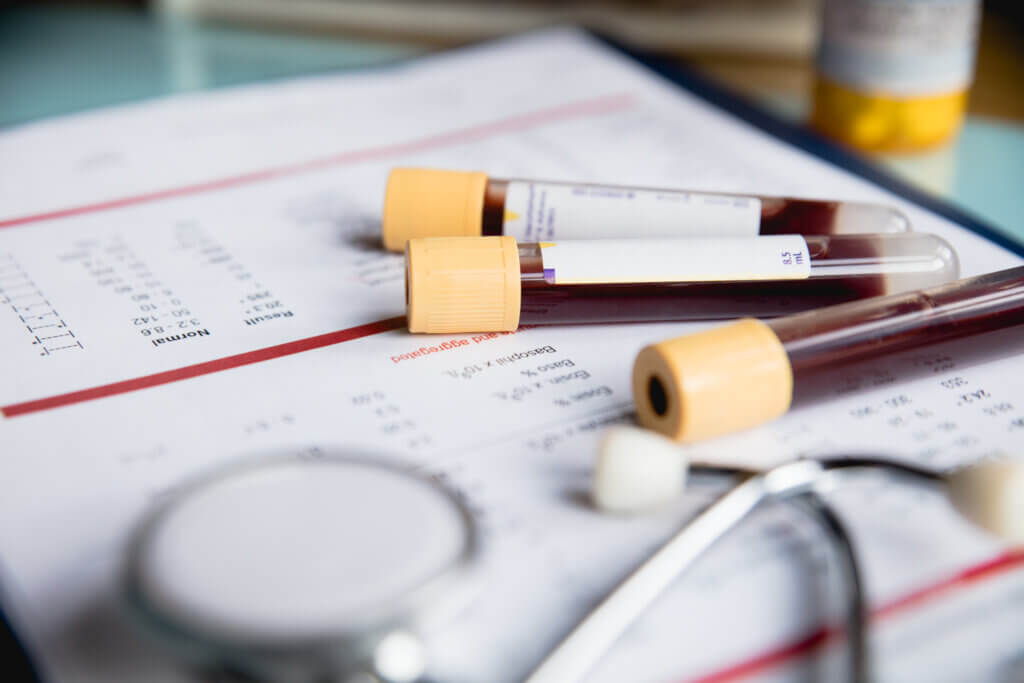Leukemia is a group of cancers of the blood cells. More than 60,000 new cases of adult leukemia are estimated in the United States for 2022 and it is one of the most common types of cancers in children. These cancers are classified as either acute, which means the cancer is fast-growing, or chronic, in which cells grow slower over time.

Symptoms of leukemia, such as fever and unexplained weight loss, can vary due to a variety of factors and may simply indicate a less serious health issue. The best thing to do if you notice any changes in your health is to contact your doctor or a medical professional.
While patients with acute (fast growing) leukemia have symptoms that require immediate treatment, many patients with slow growing (or chronic) leukemia will not experience symptoms. This means that sometimes patients with chronic leukemias may find out they have the disease after an otherwise routine blood test.
What are the symptoms of leukemia?
These common symptoms may signal leukemia:
- Fatigue and weakness
- Unintended weight loss
- Fever and chills
- Excessive nighttime sweating
- Thickening of the gums
- Shortness of breath
- Headache, dizziness or changes in vision
- Bleeding or bruising easily
- Petechiae (tiny red, purple, or brown spots under the skin)
- Pale skin
- Frequent infections
- Bone and joint pain and tenderness
- Painless lumps (swollen lymph nodes) in the neck, underarm, stomach or groin
- Swelling and discomfort in the midsection
- Loss of appetite
Any of these could be the first sign of leukemia. Many of the symptoms of leukemia, such as fever and unexplained weight loss, occur across all subtypes of the disease, from acute myeloid leukemia to chronic lymphocytic leukemia and others. A leukemia specialist trained in hematology-oncology will order specific tests to determine what type of leukemia is causing symptoms.
Where does leukemia usually begin?
Leukemia starts in the bone marrow — the soft, inner part of the bones, which is responsible for creating blood cells in the body. It may eventually spread into the blood, and from there, other parts of the body such as the lymph nodes, liver, spleen, and other organs.
How does leukemia affect the body?
Leukemia affects the cells in a patient’s bone marrow that create blood cells. The symptoms of leukemia arise when leukemia cells make many copies of themselves preventing the bone marrow from producing the normal amount of red blood cells – which carry oxygen to the tissues of the body, white blood cells – which protect the body from infection, and platelets – which stop bleeding.
Can leukemia be detected in a blood test?
Yes. A doctor can use a sample of blood to determine if there are abnormal levels of red or white blood cells, or platelets which may be a sign of leukemia. A blood test may also show leukemia cells if the cancer has spread from the bone marrow.
For a more accurate diagnosis, doctors will perform a bone marrow biopsy, a procedure in which some bone marrow — often from the hip bone — is removed using a long, thin needle. A laboratory can investigate this sample for leukemia and perform tests which might reveal certain characteristics of the cancer used to determine treatment options.
Who is most at risk for leukemia?
There is no accurate way to determine who will and won’t develop leukemia in their lifetime. However, there are certain factors that indicate potential for increased risk of having leukemia:
- Age – those over the age of 65 are generally more at risk for leukemia.
- Exposure to high levels of environmental radiation (i.e. from an atomic bomb)
- Previous cancer treatment such as chemotherapy or radiation therapy
- Genetic disorders such as Down syndrome or bone marrow failure syndromes
- Family history of leukemia
- Environmental factors such as smoking or exposure to industrial solvents
- Prior diagnosis with a bone marrow disorder such a myelodysplastic syndrome (MDS), or myeloproliferative neoplasm (MPN)
Learn more about the risk factors, symptoms, and treatment options for leukemia from Dana-Farber’s/Brigham and Women’s Cancer Center Adult Leukemia Program.
About the Medical Reviewer

Dr. Weeks is an Instructor in Medicine at Harvard Medical School and a physician-scientist in the adult leukemia program at Dana-Farber Cancer institute. Dr. Weeks received her MD and PhD from Case Western Reserve University School of Medicine. She completed residency in Internal Medicine at Brigham and Women's Hospital and fellowship in Hematology/Oncology at Dana-Farber/Mass General Brigham Cancer Care Program. Dr. Week's clinic focuses on the care of patients with precursors of the myeloid malignancies including clonal hematopoiesis of indeterminate potential (CHIP) and clonal cytopenia of undetermined significance (CCUS). Her research focuses on understanding features of CHIP and CCUS that impact the progression to overt myeloid diseases such as myelodysplastic syndrome (MDS) and acute leukemia.
